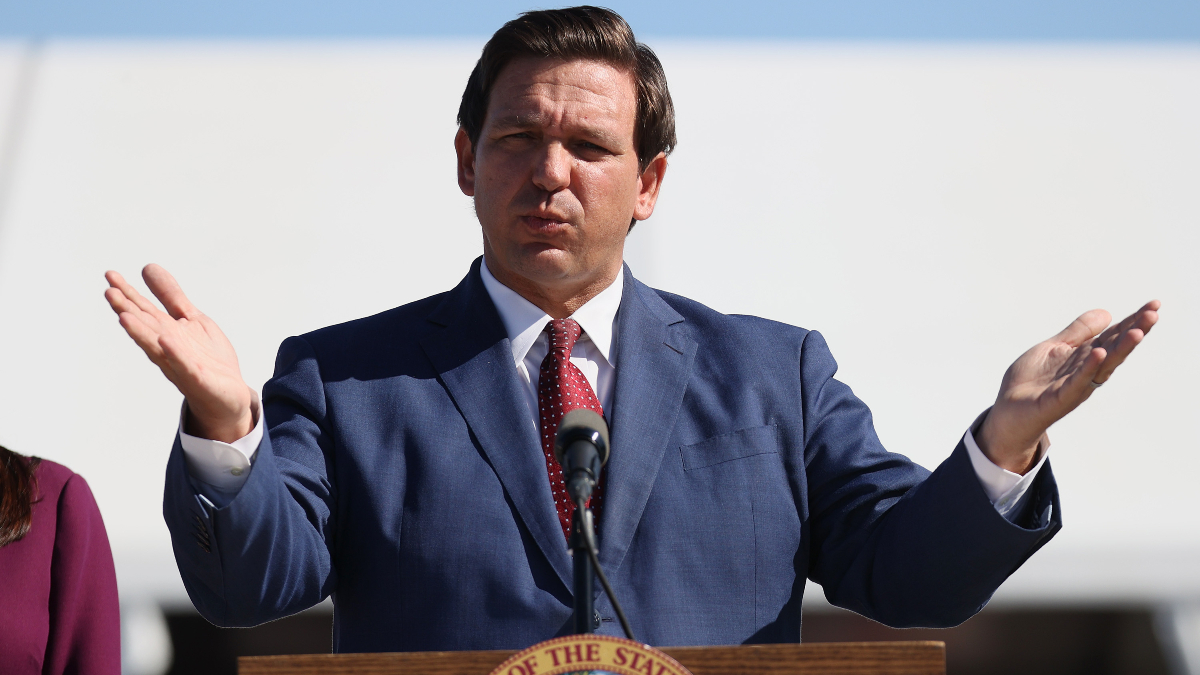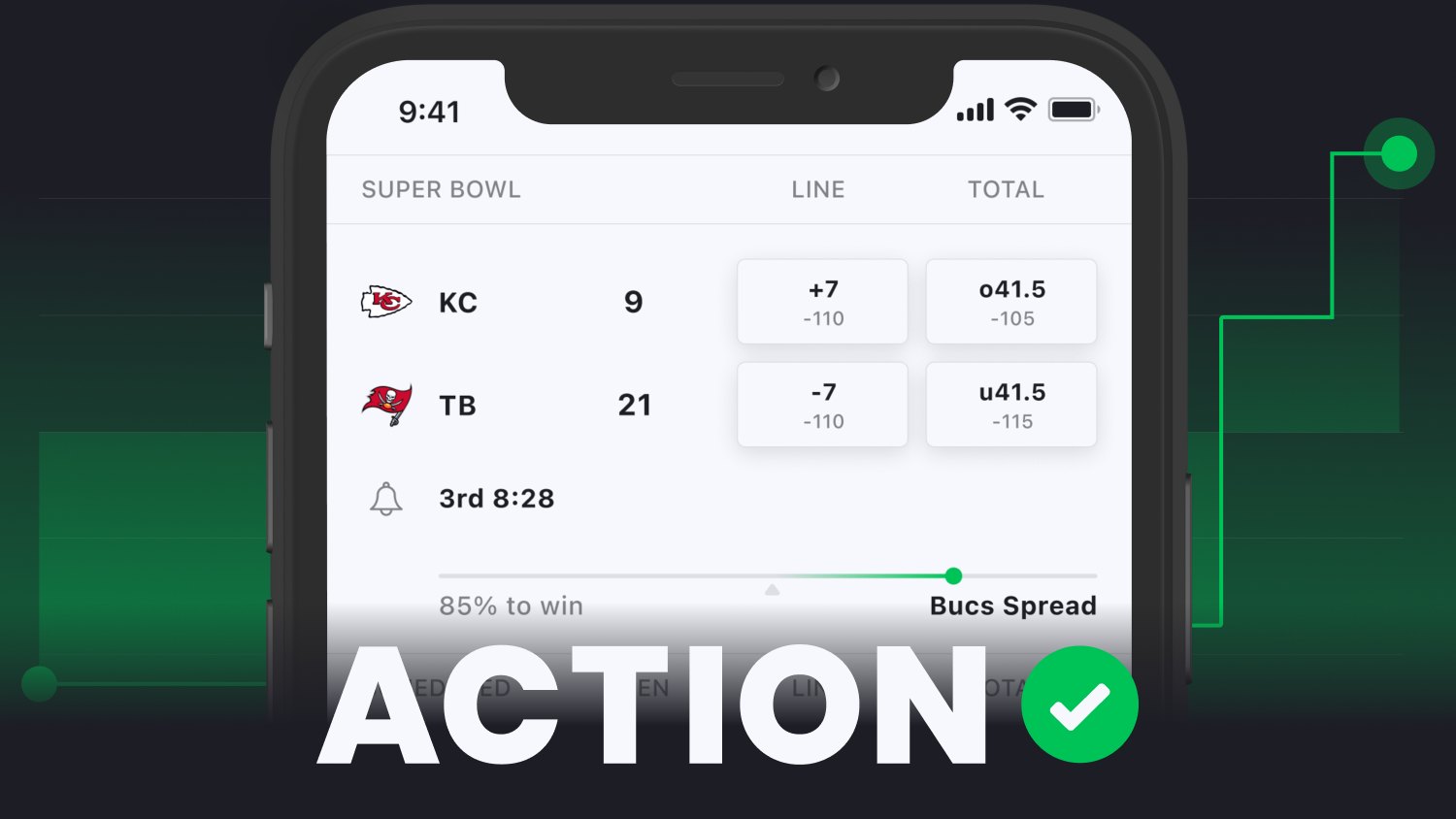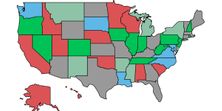What Comes Next for Florida Gaming Compact and Sports Betting
Joe Raedle/Getty Images. Pictured: Florida Governor Ron DeSantis.
Florida lawmakers approved a sweeping gaming compact with the State’s Seminole tribe Wednesday that would allow online and retail sports betting but faces possible federal and state legal challenges that could prohibit its ratification in part or in its entirety.
In what is at least politically the simplest part of the compact’s implementation, the Florida House of Representatives passed the legislation ratifying the deal 97-17. The Senate approved the same legislation 38-1 a day earlier.
Key Details
Along with exclusive online and retail sports betting access, the deal grants the Seminoles rights to offer new games such as craps and roulette and open additional gaming facilities on certain tribal reservations.
In exchange for a 30-year exclusivity agreement that will prohibit any new commercial casino gaming entities in the state, the Seminoles will guarantee $2.5 billion back to the state over the next five years and $500 million or more annually through the deal’s duration.
If federal officials sign off on the deal and it survives further legal challenges, statewide mobile wagering and retail sportsbooks could begin Oct. 15. The compact permits the Seminoles to open a statewide mobile sportsbook under their Hard Rock brand and also partner with any of the state’s dozens of pari-mutuel facilities.
Under the pari-mutuel partnerships, third-party sportsbook brands would be able to accept bets in the state but would have to give 40% of profits back to the tribe and also operate as a de facto subsidiary of the Seminoles. Seminole Gaming CEO Jim Allen testified during the special session that DraftKings, FanDuel, BetMGM, Barstool Sports and other leading sportsbook brands have already inquired about market access.
It remains to be seen what operators would pursue such an arrangement. Florida is the nation’s third-most populated state and one of its most visited tourist destinations, but the structure handicaps revenue potential in what is already a small-margin industry.
The compact requires the Seminoles to engage in “good faith negotiations” with at least three pari-mutuel operators for sports betting partnerships. If the tribe can’t reach these deals, the Seminole’s share of sports betting revenues they would pay the state increase from 13.75% to 15.75%.
Federal Hurdles
Gov. Ron DeSantis, who along with Seminole Chairman Marcellus Osceola Jr. announced the groundbreaking deal last month, is expected to sign the agreement in the coming days. The compact then goes to the federal Department of the Interior where it would appear to run against federal law.
The Indian Gaming Regulatory Act (IGRA) of 1988 gives federally recognized tribes certain gaming rights on sovereign lands. The act and ensuing court decisions have restricted this exclusively to in-person bets, not online wagers.
Citing New Jersey’s commercial casino structure and an Oklahoma arbitration decision, Florida compact proponents argue the deal’s online sports betting provisions are permitted under federal law. By placing all computer servers on Seminole lands, advocates argue, the deal passes legal muster.
Some legal analysts and state lawmakers worry the deal won’t survive the DOI’s scrutiny. Similar tribal-run online gaming ventures have been rejected under IGRA, and this compact’s approval could open up major additional legal avenues for other tribes seeking online gaming access.
The pari-mutuel arrangements, part of a “hub and spoke model” championed by the compact’s legislative supporters, could also face rejection. Notably, the compact has a severability clause that allows it to take effect even if certain portions or not approved.
This means the Seminoles could be allowed to open retail sportsbooks at their seven existing tribal casinos even as the online and pari-mutuel portions of the deal are in legal limbo or struck down entirely. That would then create a de facto sports betting monopoly excluding every other operator not under direct Seminole control.
Federal officials have 45 days from officially receiving the compact to make their decision, meaning a determination should come in late July or early August. The compact takes effect as written in the seemingly unlikely instance the Interior Department takes no further action.
State Hurdles
No Casinos, a Florida-based advocacy group, announced Wednesday it would challenge the compact on the grounds that it violates a 2018 voter-backed amendment that prohibits gambling expansion without voter approval.
“The fight is just beginning,” the organization said in a statement. “We are committed to ensuring that the will of the people, who voted by a remarkable 72 (percent) landslide to give Florida voters the exclusive right to authorize casino gambling in our state, will be respected.”
The 2018 amendment prohibits the legislature from passing any new form of casino gambling without a voter referendum. The compact’s legislative supporters argue it falls under tribal gaming exemption and isn’t subject to voter approval.
Some gaming industry lawyers also believe sports betting is exempt from the restrictions as it wasn’t a common form of casino gambling when the amendment was voted on in November 2018. At the time only a handful of states had opened retail or online sportsbooks.
That view is far from unanimous. Rep. Michael Grieco said before Wednesday’s floor vote the compact and its enabling legislation violated the amendment.
“We’re going to go to court.” Grieco said. “We’re going to lose. We’re going to see it go to the ballot.”
In such a scenario, Florida voters couldn’t approve sports betting until fall 2022 and legal wagering wouldn’t begin until 2023.
The compact’s supporters and opponents both acknowledged the legal jeopardy at the state level. It’s unclear how, when or which way courts or legal challenges will shape sports betting and the compact overall, but it creates another variable in what could be a lengthy and contentious implementation process going forward.
Bottom Line
Last month’s compact announcement cleared a years-long political and logistical stalemate and the largest hurdle for Florida sports betting. The state and federal hurdles remain and legal wagering’s launch, format and many other questions are still unanswered.
How would you rate this article?


